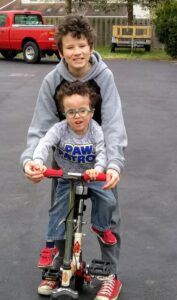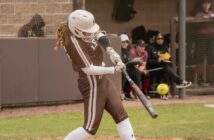
Anissa Telle’s 13-year-old son Connor (top) who has autism and ADHD and her three-year-old son Evan (bottom) who has autism, cerebral palsy and developmental issues. Both of Telle’s children are learning remotely as a result of COVID-19. Courtesy of Anissa Telle.
Before the pandemic struck, 19-year-old Logan Wismer was in his life skills classroom five days a week. However, since March, Wismer’s home school district has reduced his in-person curriculum to a remote class only meeting for a few hours each week.
The social and living skills Wismer would receive from the hands-on experience have become almost nonexistent due to COVID-19.
“Instead of doing it themselves, they are watching someone else do it for them over a video,” said Kim Wismer, Logan’s mother. “He’s struggling to focus, and it’s not as much of a hands-on experience anymore, which would do much more for him.”
Kim Wismer’s son is one of many children within the Lehigh Valley school districts who have paid the price since transitioning to virtual learning.
School districts’ special education administrators in the Lehigh Valley have said they are committed to maintain and ensure educational stability for all amid the COVID-19 pandemic. Yet, with a global transition to more independent means of learning, special education students have had to face unprecedented hurdles.
To make up for the loss of in-person classes, both Lehigh Valley school districts are focusing on cultivating and bettering their curriculum delivery for students who are learning by either a remote or hybrid model.
For students with disabilities, the improved remote learning has still been extremely challenging. Some of the biggest issues special education children have faced have had to do with increased independent work.
With the pandemic’s diverse set of circumstances, more attention is needed to maintain structure and consistency for special education students who need additional occupational and life skills support.
Students in the Lehigh Valley either learn by either a fully remote model or by a hybrid model in which they go to school twice a week in-person and complete the remainder of work online.
Nonetheless, for there to be a smooth transition into virtual learning, students need access to electronic resources.
Leigh Rusnak, Bethlehem Area School District’s director of special education, said they have always been forward-leaning in technology integration and have provided all grade students with Chromebooks. Brian Siket, Allentown School District’s executive director of special education, said they had distributed an array of iPads, Chromebooks, and Dell computers to those in need.
However, compared to the learning environment before COVID-19 hit, the virtual education platform has made a concentrated class environment for special education students nearly impossible to maintain.
“It has been extremely challenging, especially for students with disabilities, to give special instruction virtually,” Siket said. “It’s (difficult) for students to sit in front of a computer screen for hours on end.”
For Anissa Telle’s 3-year-old son Evan, who has autism, cerebral palsy and additional developmental issues, adjusting to a screen posed significant challenges.
Telle said the adjustment was difficult because her youngest son had never been exposed to a computer screen beforehand. Yet, the novelty of seeing people he knew on a screen fascinated him and made him have a better attention span, Telle said.
But it was the opposite for Telle’s 13-year-old son Connor, who has autism and ADHD.
“To focus on Zoom meetings from 8:30 a.m. to 3 p.m. is a long time for someone who has trouble staying (concentrated),” Telle said.
Siket said the Allentown School District is working to find ways to reach students, and although it is not optimal, they are adapting and learning how to get through it.
Despite the school district’s efforts, the current learning environment has become a significant concern for special education students who require personal attention and interactions. Still, they said special education programs are working with parents to give them strategies toward delivering curriculum to their special needs children.
With little to no physical engagement, the school districts have had to make a plan to structure the learning environment for special needs students to better their quality of learning experience, said Megan Stocker, a seventh-grade learning support teacher at East Hills Middle School in Bethlehem.
Special education staff is working to mitigate and overcome the lack of personal connections of remote learning over Zoom by creating personal interactive lesson plans for each special education student who requires a unique and flexible schedule to continue their educational development, Stocker said.
“Concerns for special needs children that are not able to follow through and get things done have now escalated even more because of being home and having to be more independent compared to us (teachers) being there to hold their hand,” Stocker said.
Despite the accommodations that have been made, Telle remains concerned about the implications remote learning has had on her son Connor.
“I already had concerns prior to the pandemic starting,” Telle said. “I saw how far behind he was, and remote learning has really increased that gap.”
Telle transferred her son from a public school to the Lehigh Valley Academy, a charter school, to receive the support necessary for his educational development.
Coping with the integration of technological resources has wreaked havoc for special education because of the COVID-19 pandemic.
“This pandemic has stopped so much more than education for everyone,” said Wismer.
Lifestyle Section Editor Andrew Issacson contributed to this story.





Comment policy
Comments posted to The Brown and White website are reviewed by a moderator before being approved. Incendiary speech or harassing language, including comments targeted at individuals, may be deemed unacceptable and not published. Spam and other soliciting will also be declined.
The Brown and White also reserves the right to not publish entirely anonymous comments.
1 Comment
Thank you for bringing attention to this topic! A very informative mative and interesting read.